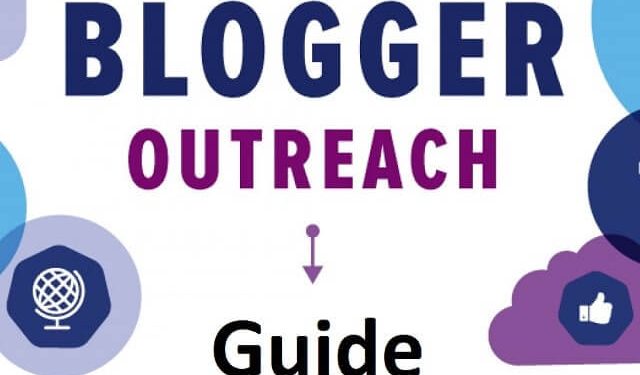While some marketers have pursued social media marketing for the ego boost (aka how many “friends” or “followers” your brand has), the traffic boost (which doesn’t necessarily convert), and whatever else, I have always recommended marketers focus on social media marketing as a means to build your authority and possibly your search engine rankings.
The fundamental idea that “social influence affects the links to your website” has never changed. Links are the currency of the web. The only thing that has changed is the landscape that surrounds this social influence.
Pre-2010 or so, you’d get emails requesting to exchange links with some other site that was “similar” in nature to yours. Those emails continued as slower-to-adopt-the-latest-trends agencies would continue sending emails to webmasters with the assumption that this tactic still works.
The Rise Of Blogging And Social Media
As social media took the world by storm, many things changed. Link exchanges fell by the wayside, and these shills who used to send out mass link exchange emails without any targeting in mind became “social media experts” instead.
Many would shift their focus to buying fans and followers and creating underground groups where people would beg others to tweet or vote upon their content for visibility purposes because “maybe someone will link to me.” Over time, that, too, became less practical, because networks figured out the same people were often scratching each other’s backs, and search engines weren’t that stupid, either.
Social media marketing is not truly dead, but social influence must be diversified if you’re to be successful. That means not getting the same three people to retweet your content, and not getting the same 10 people to Like your post time and time again.
Fortunately, if you follow my advice, you’ll break free of this approach and adopt a single tactic that works for a variety of businesses and products — but in a different way for each one. Bonus: This tactic, in addition to being diverse and varied, isn’t yet outdated.
So what is it? How do I get visibility for a product or service?
Blogger Outreach Campaigns
Enter influencer marketing, or blogger outreach services. The idea behind a blogger outreach campaign is that a company, in seeking exposure for a product or service, leverages influencers who have established a substantial following, asking them to write about it in exchange for free access to the product or service. (Sometimes, money would need to exchange hands as well. It all depends on the relationship the company has with the blogger and what the blogger commands.)
Why does this type of influencer marketing make sense?
For one thing, there are very few bloggers or influencers out there who will rip apart your product/service when receiving it for free. Sure, most disclaimers say, “I was furnished with free product, but all opinions are my own,” but think about it: How many influencers will really burn a bridge that was just established?
In truth, having been a recipient of many free products in the past decade, I can tell you this: I’ve ended up reviewing a lot of things I wouldn’t have otherwise considered even talking about. And my reviews have been either neutral or overwhelmingly positive — I haven’t had the need to write anything negative about anything, because the products don’t suck.
Something to consider, however, is that Google may look at the outright exchange of dollars (or product, or anything of value) for links as a link scheme. So requiring these folks to include a non-nofollow link could be considered shady, but the exposure you gain through these relationships could still result in additional natural links.
Here are a few examples from a campaign that meal kit delivery service Blue Apron conducted late last year:
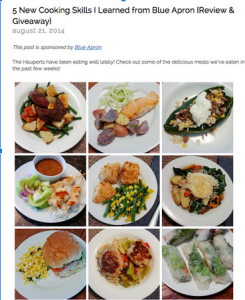
From food blog CarrotsNCake.
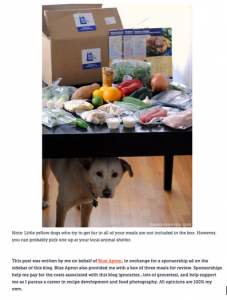
From home cooking blog Foxes Love Lemons.
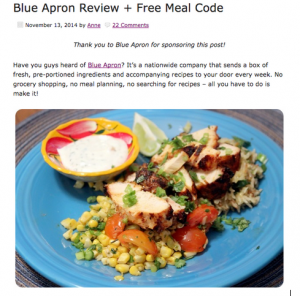
From the Victoria McGinley blog.
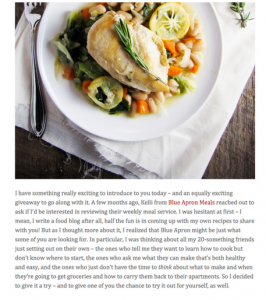
From Katie at the Kitchen Door.
Blogger Outreach Best Practices
I once wrote an article called, “How to Get an Influencer’s Attention.” Speaking with 37 still-popular influencers about the topic, I learned a great deal about how to find the right people for blogger outreach agency.
Here are my relevant takeaways:
- Study The Writer. You can ask and ask and ask, but unless you research the writer and know exactly what it is that they cover, you’re wasting your time. For example, if you’re marketing a healthy food product, don’t just reach out to food bloggers in general, but find those that focus on healthy food, home cooking, cooking healthy for kids, etc.
You can do something like this by going through blog sites, reading all of their writings, and then summarizing the aspects of their content that map to your product. You could also contact bloggers in a more automated fashion, by using tools that save you some of the time it takes to do influencer outreach. You could also outsource by contacting one of many agencies that represent bloggers and can manage the campaign on your behalf. - Simplify. Your messaging needs to be as succinct as possible. Don’t write your emails like I write my posts. Keep it simple, stupid.
I’m busy, you’re busy, the next person is busy, and information overload is less than ideal. If you don’t get to your point within the second or third sentence, you’ve lost me. Heck, I use Gmail, and I’d prefer to see the main takeaway in the snippets or the subject line. - Show Passion. Be passionate about what you’re pitching, and make sure that enthusiasm comes through in your outreach emails. As a writer, I love emotional pitches because they really mean something.
Oh, and don’t hire an agency if you’re that passionate. You can’t outsource passion, so keeping the work in-house would be a better choice.
Also, don’t be annoying. Passion is one thing, but stalking is another. You don’t want to risk alienating those exact folks you’ve identified as having so much influence in your category. - Be Creative. Creativity is important. If you’ve got a breakthrough product, that’s great. But if your offering is an also-ran, why should the influencer care? Unless there’s an incredibly unique selling proposition, most people won’t bother (and may even be offended that you wasted their time). Explain how your brand is different, or surround it with a creative and useful content initiative.
- Build Trust. It’s all about relationships and trust! Either you have an existing relationship with someone who is able to reach out to the influencer on your behalf, or you need to work really hard to become their friend. Follow them on Twitter, comment on their blog, wine and dine them, etc.
Just the other day, a friend of mine hosted a demo of a tool I loved and told him about. Normally, he wouldn’t indulge anyone with a demo — time is money, people! — but he gave me the time of day because he trusted me. And, because he was blown away by the offering, he’ll trust me next time I approach him about something.
Remember, you could kill a relationship as quickly as you start it if you waste people’s time and don’t follow the aforementioned prescriptions.
With that said, the best practice to follow when contacting bloggers, whether you’re a PR person or an in-house marketer at a company in need of publicity, is to work hard for their attention and keep at it. It doesn’t hurt to get an introduction from a friend you have in common if that’s a possibility

